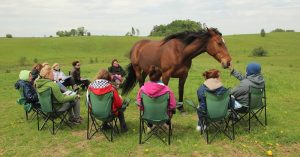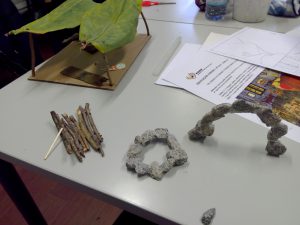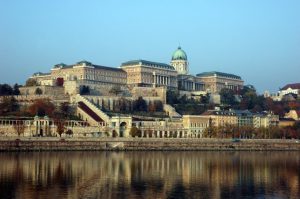Project Overview
The project was based on four key international trainings during which a hosting country presented and taught its innovative methodology. Each international training gathered 16 participants: 4 supervising trainers and 12 youth leaders – 4 people from each of the partnering country.
Youth leaders that have taken part, have used this week long training as an opportunity to narrow down values which they find to be most important in their life. They could then test these values „In Action” by planning and executing a project after returning to their country of origin.
Experience & learn
INNOVATIVE METHODS OF WORKING WITH YOUTH
Here are the 5 methods that were included in VIAME project. Click on chosen picture to see a detailed description or choose a method from a main menu of page navigation.
By Atalaya Foundation
It encompasses action, improvisation as well as taking on and fully committing to roles. It’s a method of self-development that engages the youth on three levels: physical (body movement, senses), emotional (engaging emotions) and intellectual (discussions, feedback, drawing conclusions, activating participants’ knowledge).
By Atalaya Foundation
A method in which people work together with horses. Its aim is to deepen individual development, self–awareness and emotional and social skills, as well as to help participants achieve the change they desire. The way a horse relates to us is absolutely authentic, which means we are experiencing a genuine relationship, communication and leadership.
by Ljudska univerza Radovljica
Project Learning of Young Adults was designed by Slovenian Institute for Adult Education. The programme includes young people who dropped out of regular school and has been proven to be highly effective. As participants actively engage and decide on the course of the programme, the motivation to participate and to continue education is strengthened. Learning through projects along with individual work, gives good results.
By University of Porto
It is based on a deep curatorial process, which enables the assertive invitation to creators and artists to develop projects in site-specific, participative, community and educative, building bridges, making connections, integrating and accompanying them throughout the process of work with the local public.
by Látótér Alapítvány
The SSCA method and its techniques improved for photography demonstrate a way of thinking that enables uncovering the personal and hidden messages of the target group’s visual communication. This also provides an opportunity to design such tasks that facilitate individual goal completion.
Problem overview
In 2011 the employment rate of youth aged 15 to 24 years fell to 33.6%, the lowest level ever recorded in the history of the European Union. We firmly believe that there is a need to support youth in the choices they make at the beginning of their career path.
We should encourage values such as entrepreneurship, creative thinking and developing passion which can later become an important element of one’s career. In order to meet the demands of the dynamically changing labor market, educational programs should provide both key competences required for today’s job positions and shape long-lasting values such as self-steering, independence and high work ethic.
A reoccurring problem is the lack of innovative teaching methods that will effectively answer the needs of youth and help them develop competences in a long-term perspective. The goal of this project is to help youth master communication in both native and foreign language, encourage independent thinking and learning, improve social skills, create the environment for expanding personal initiative and social entrepreneurship and increase cultural awareness. In addition, we aim to strengthen social entrepreneurship among youth, by supporting them in conducting “values in action” projects, addressing a chosen social problem in their local communities, as a continuation of activities during the transnational meetings.
Main goals of the project
Organizations involved
POLAND, SLOVENIA, PORTUGAL & HUNGARY
Atalaya is an educational foundation founded at the end of 2014. We are mainly focused around education and supporting youth and young adults in their quest for designing and fulfilling their plans for self-development.
Our mission is creating a safe space for meeting the developmental needs of teenagers in foster care as well as their closest surrounding. We support them in their personal growth throughout their lives, focusing mainly on empowerment, building relationship skills and strengthening self-esteem.
Our educational programs are prepared to suit the needs of our participants, utilize innovative methods of teaching and a proactive approach to learning and a personal responsibility for one’s own personal growth.
Adult Education Centre Radovljica is a public institution established in 1959.
The primary activity of the institution is adult education (advising, informing, primary and secondary school education).
It carries out the programme Project Learning for Young Adults (PLYA), which is intended by young dropouts and Youth centre for children and youth.
The elderly are included in the University of the Third Age and Intergenerational Centre.
Adult Education Centre Radovljica participates in European project Erasmus+, which enables the participants learning mobility, knowledge and good practice transmission in state members of the European Union.
Faculty of Fine Arts is one of the oldest and most highly regarded European art schools, having just completed 230 years of existence.
For centuries the institution has trained artists and designers who have contributed to Portuguese culture and presence in the world.
Our involvement in the VIA-ME project is mainly connected to the Masters Degree in Art and Design for the Public Space – MADEP, whose field of study operates and intervenes within multiple approaches to Landscape and Public Space, with strong social and relational concerns.
The Masters pluri and inter-disciplinary character aims to develop reflexive and critical tools in the approach to the social, political, historical and urban domains, by engaging with local communities in order to develop live projects that link art and design practice with the society at large.
Látótér Foundation was established in 2014 after many years of informal cooperation of its founders. The name of our foundation (Látótér) literally means „field of vision”.
It’s meaning has many layers, but one of the most important to us is the awareness of its existence: physically the human eye is capable of “seeing” only a small portion of what surrounds us. To be able to see more we have to move our eyes, heads and body: change our perspectives, focus and position.
With this active attitude and effort we can realize many things outside our limited perspective about our communities and about ourselves.
To share this attitude with our communities we run a vocational school in Gárdony, and we are carrying out local and international projects, organizing cultural and educational events.
Project timeline
check the following actions











